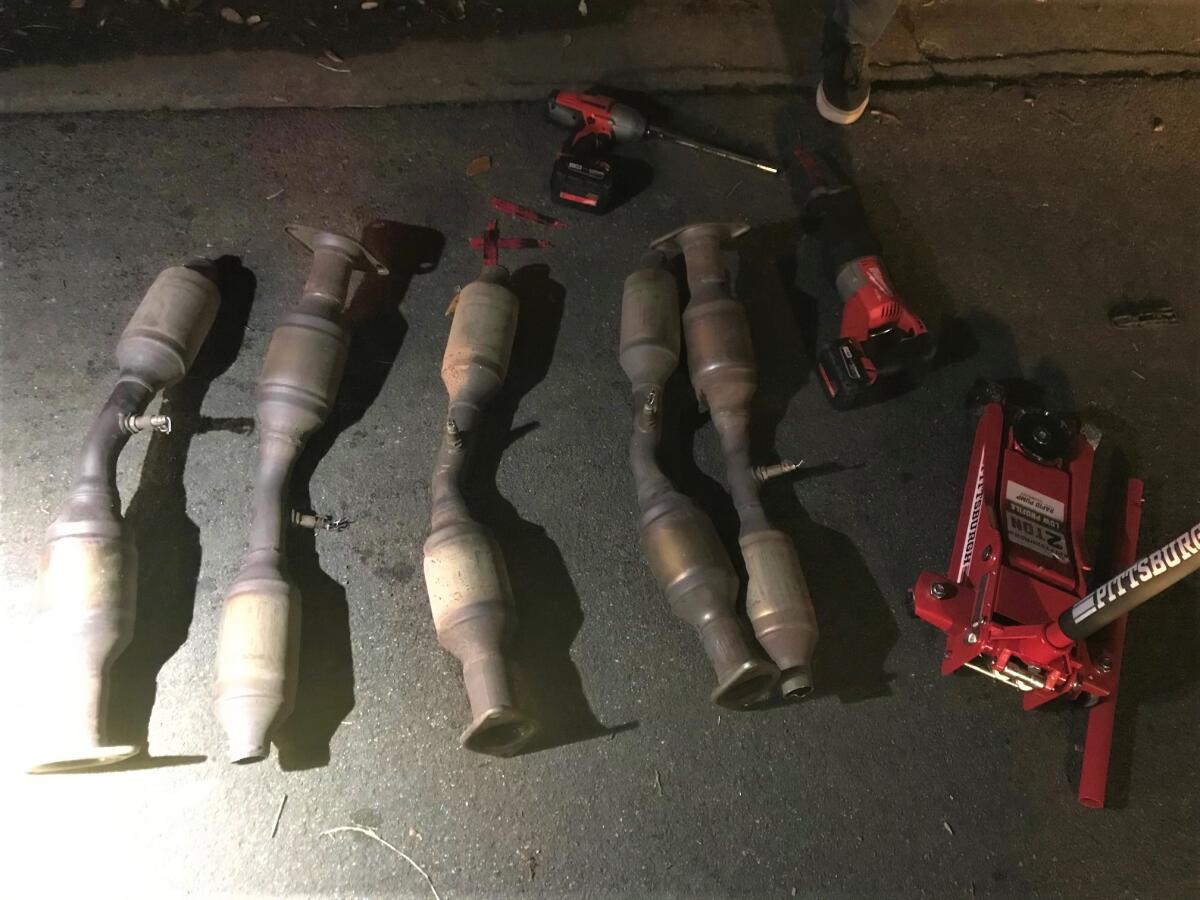More O.C. cities crack down on catalytic converter thefts

- Share via
More Orange County cities are aiming to crack down on catalytic converter thefts, which cost residents thousands of dollars to replace.
Following in the footsteps of surrounding cities, Fullerton and Placentia council members this week approved ordinances that criminalize the possession of unattached catalytic converters without adequate proof of ownership. Since the beginning of the pandemic, California has seen a sharp rise in the theft of catalytic converters, an automotive device that improves air quality and the performance of a car by converting toxic emissions into less harmful gases.
So far, Irvine, Lake Forest, Dana Point, Westminster, Mission Viejo, San Juan Capistrano and Huntington Beach have moved forward with efforts to deter catalytic converter thefts. Costa Mesa is also working on an ordinance. There are also a number of efforts at the state level to regulate the thefts.
However, no state or federal legislation currently exists that punishes catalytic converter thefts without an identifiable victim, according to a Placentia city staff report. The Fullerton and Placentia ordinances seek to resolve this issue.
During a presentation at the Placentia City Council meeting, Police Chief Brad Butts said that catalytic converter thefts have dramatically increased in the city since the pandemic began. There were 116 catalytic converter thefts last year, compared to 68 in 2020. This year, the city already has had 55 thefts.
Catalytic converters are expensive to replace, costing residents between $116,000 to $290,000 last year, according to Placentia police data. The automotive device is made up of rare metals like platinum, palladium and rhodium, which can be sold for high prices by those who steal them.
“It’s a huge loss to the residents of our city,” Butts said. “... These thefts are on the rise, and it’s very lucrative to steal catalytic converters.”
Another major issue that contributes to the theft of catalytic converters is there aren’t serial numbers or other identifiers on most catalytic converters that would allow police to match them with a vehicle. Butts said some cities encourage the public to go to police stations to get identifiable markings on their converters, “but by and large, most of the victims don’t have any markings on them, and there’s no way for [police] to match that actual catalytic converter.”
Butts said stolen catalytic converters can end up being sold to recyclable companies. While many require documentation from potential sellers, there are several in the county that aren’t as stringent, Butts said, adding that the department will be notifying local recyclable companies about the city’s new law.
According to a city staff report, catalytic converter parts can be sold for between $1,000 and $17,000 per ounce in the recyclables market.
“Criminals are incentivized to commit these thefts because they generally go undetected,” Butts said. “These crimes are completed in just seconds during hours of darkness in the middle of the night ... There is an abundance of recycling companies available to sell these off to. Victim identification is difficult and prosecution is unlikely. It’s not able to lead back to a victim, so it’s very difficult to get D.A. prosecutions on these cases.”
Mayor Rhonda Shader said that the rise in catalytic converter thefts have created an “intolerable” situation for residents.
“I’m in the insurance business and these create claims, and we all pay for that because the premiums go up when we have too many claims,” she said. “So it’s a really important item for us to address. In an environment where officers have tools taken away, I’m glad we could provide a tool to help deter criminal activity in our city.”
The Fullerton City Council unanimously approved the ordinance without discussion.
All the latest on Orange County from Orange County.
Get our free TimesOC newsletter.
You may occasionally receive promotional content from the Daily Pilot.




